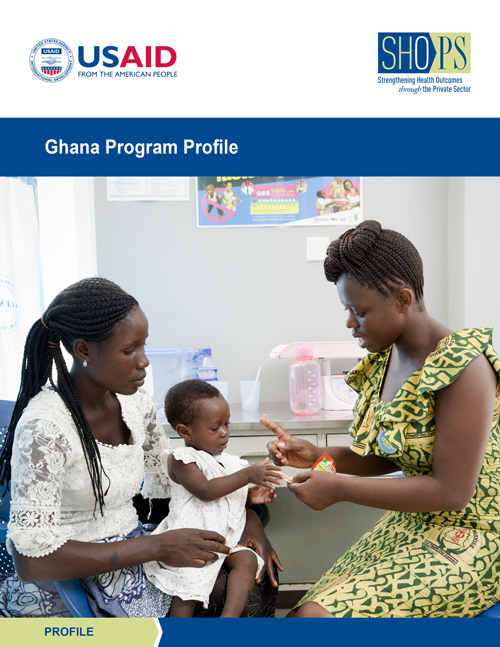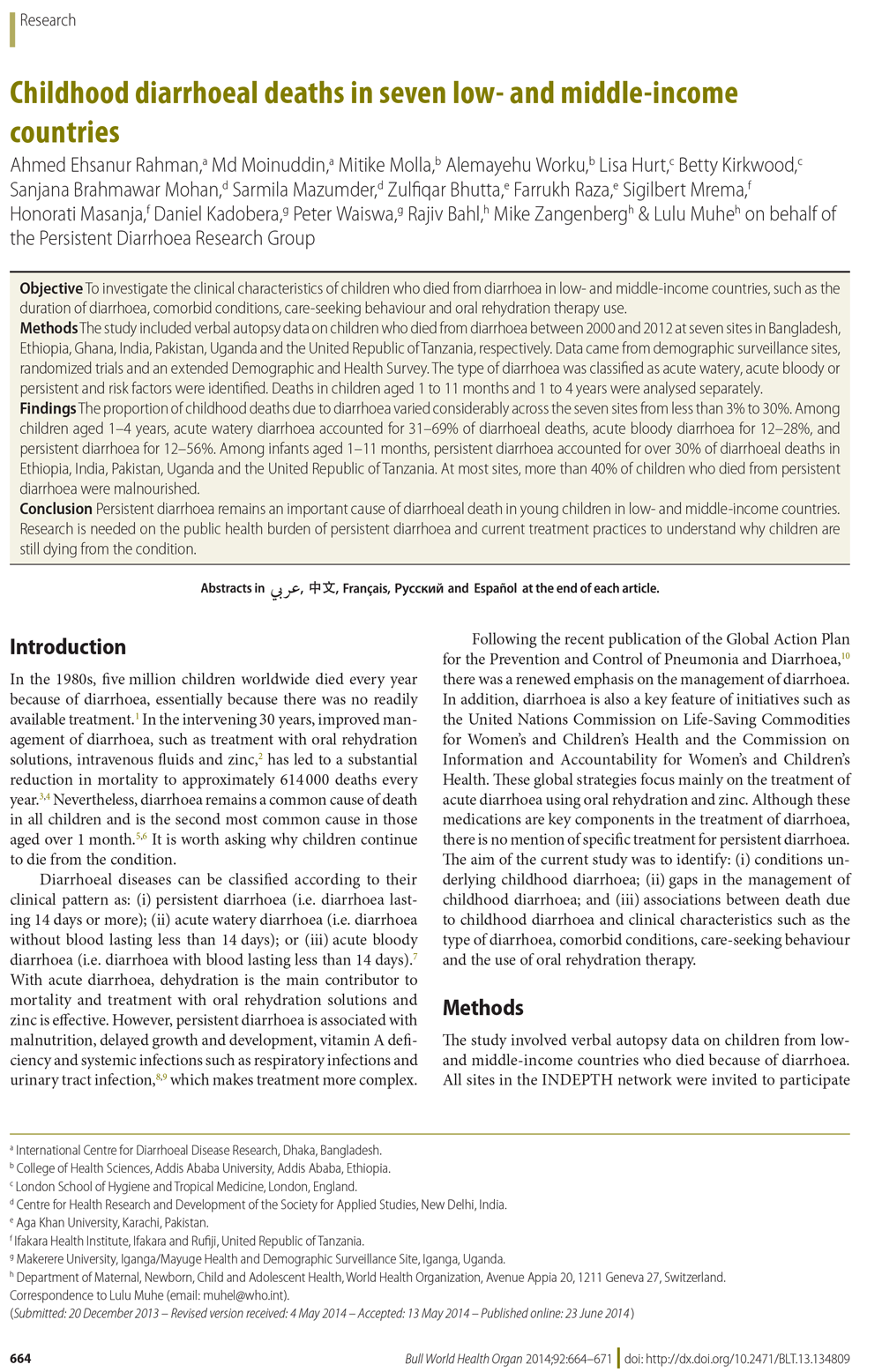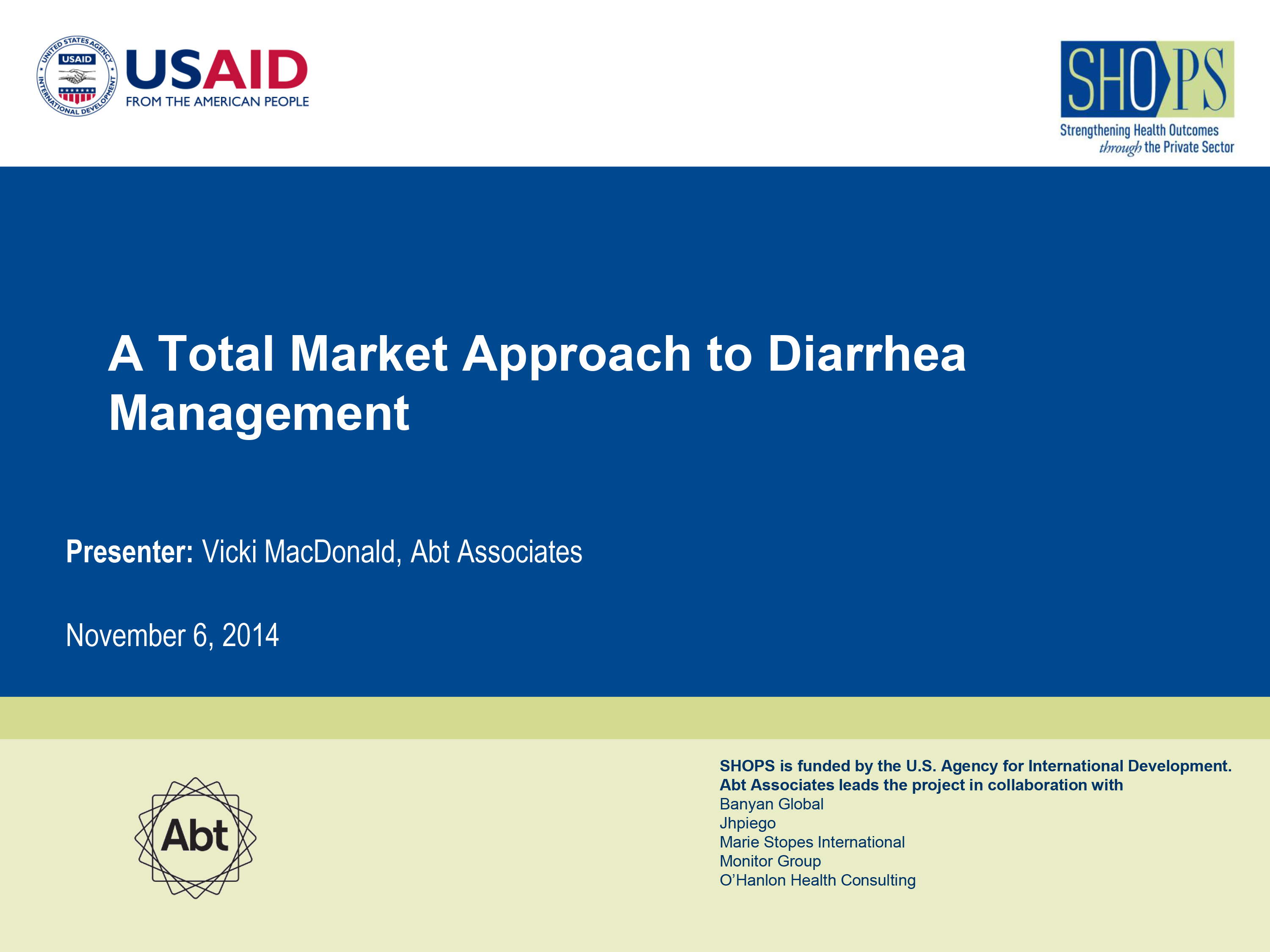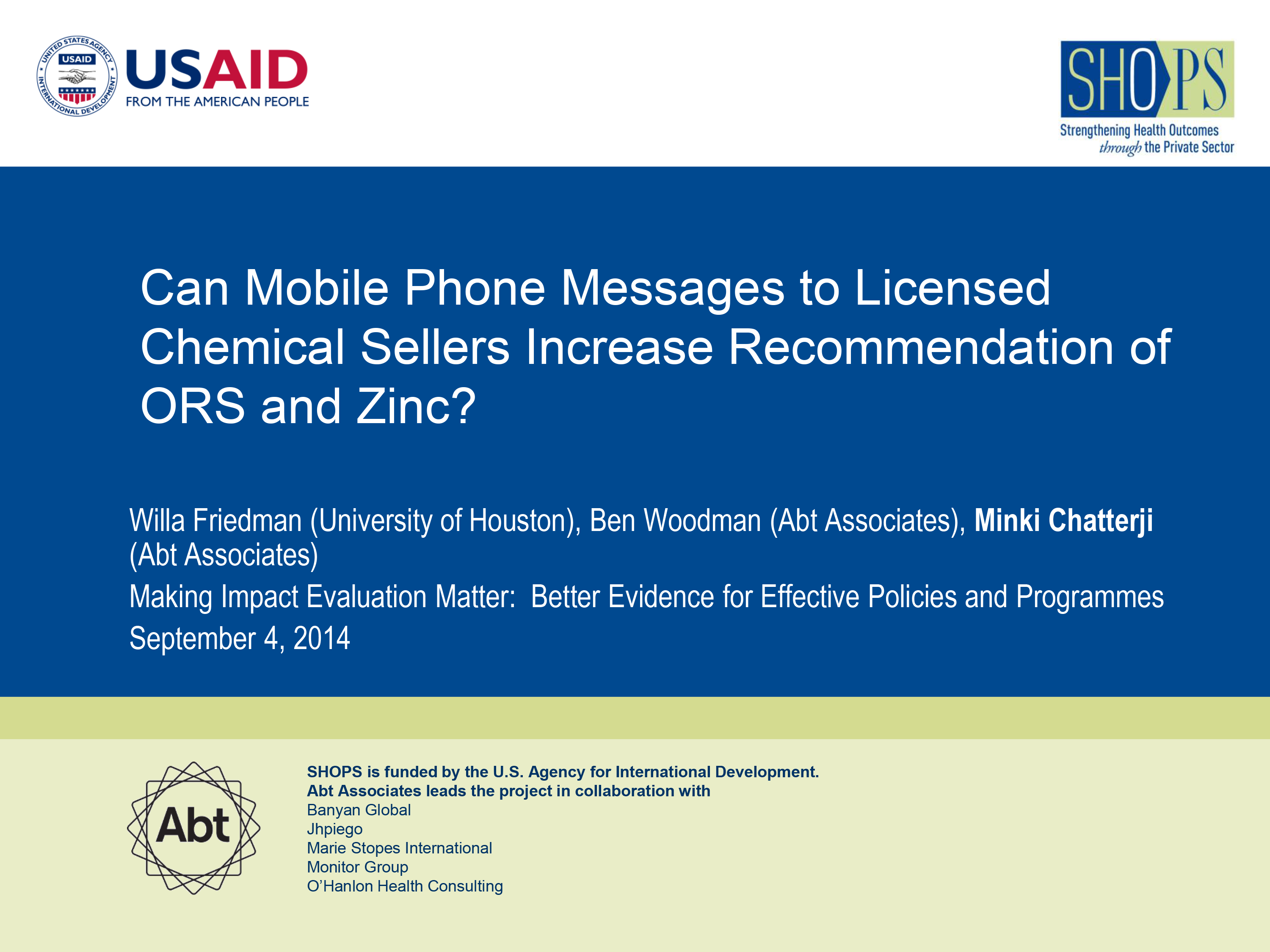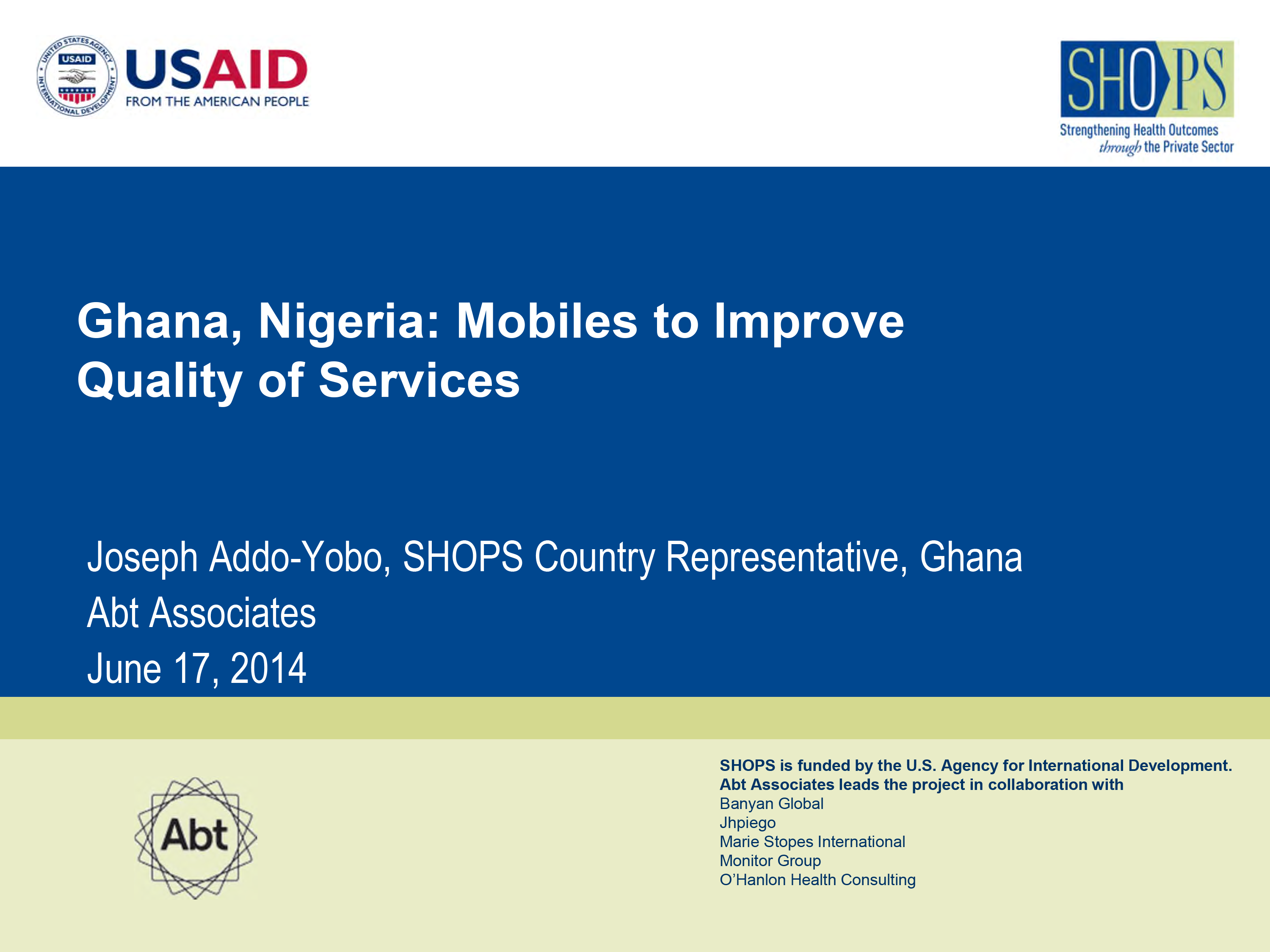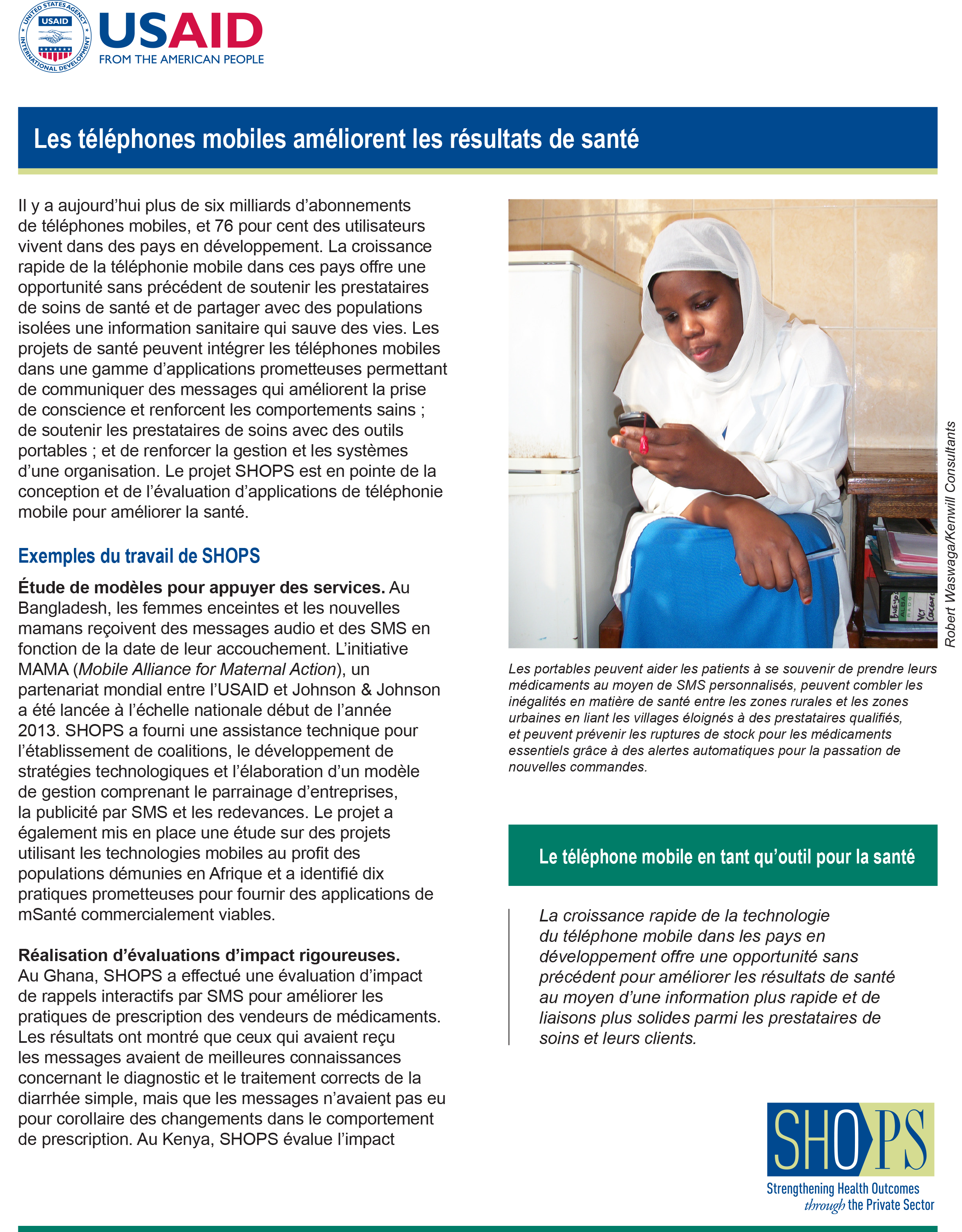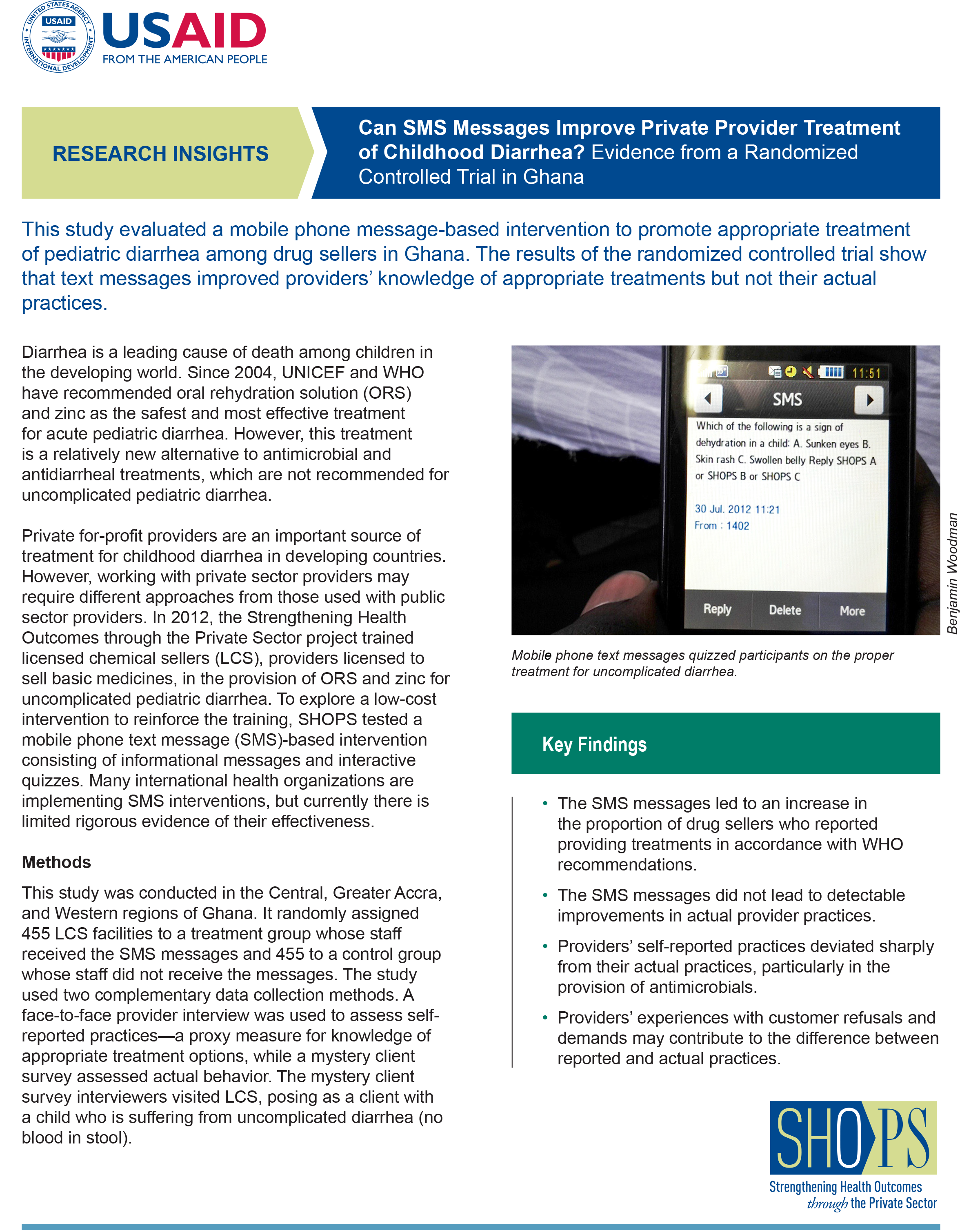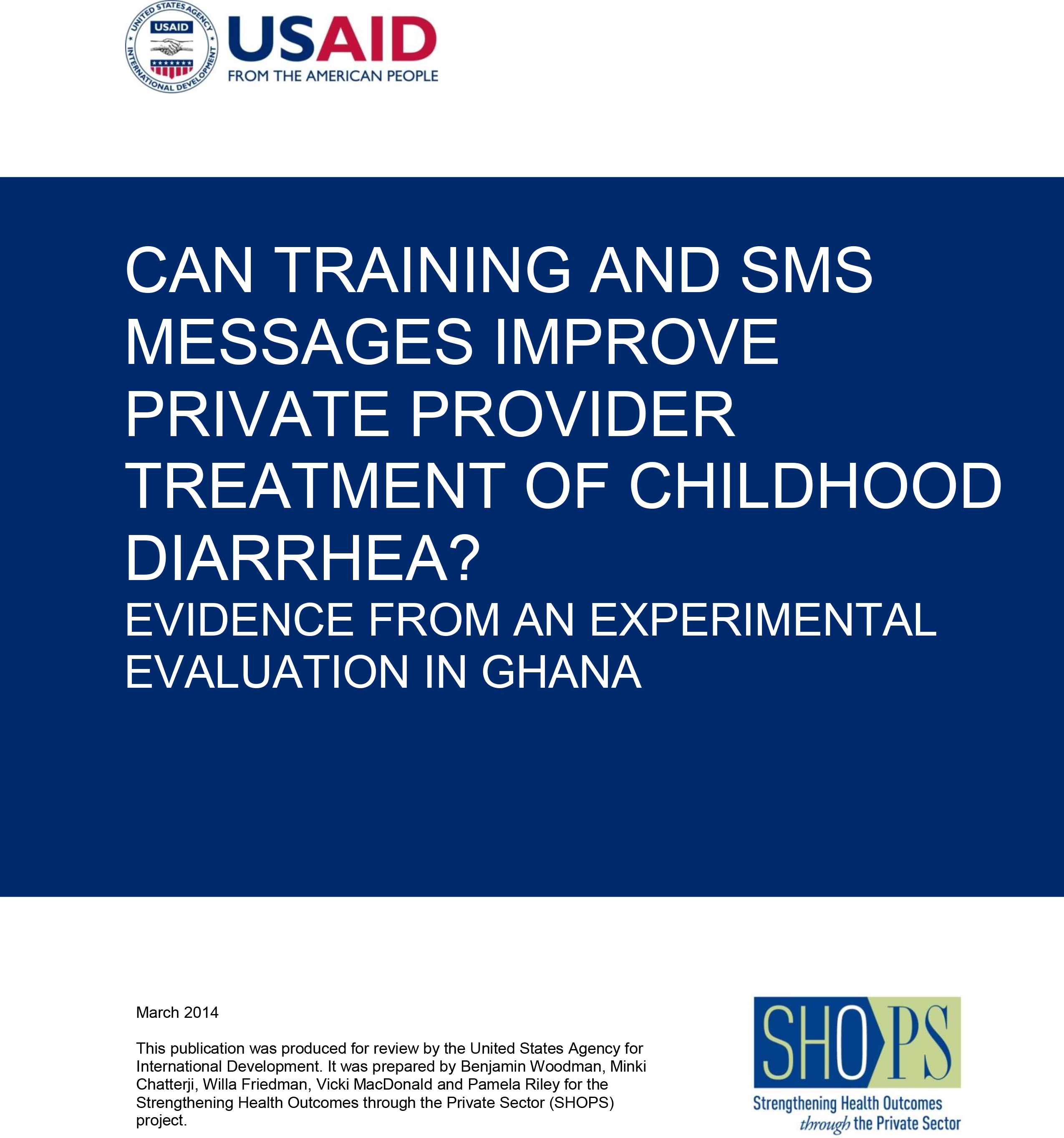
Resource Library
Ghana Program Profile
In September 2011, the USAID mission in Ghana invited the Strengthening Health Outcomes through the Private Sector (SHOPS) project to develop a program for introducing new diarrhea treatment guidelines to the private sector as a complement to public sector efforts. SHOPS developed and implemented a four-year program that focused on four main objectives: expand access to and ensure a sustained supply of quality, affordable ORS and zinc through private sector channels; improve consumer and private provider knowledge of correct use and effectiveness of zinc as a treatment for diarrhea; and increase the use of ORS and zinc as the first-line treatment for acute pediatric diarrheas. The program was implemented nationwide, with targeted training and supportive supervision for frontline drug retailers and over-the-counter medical sellers (OTCMS) in three USAID target regions: Central, Greater Accra, and Western Ghana. This profile presents the program’s context, goals, components, results, and the following lessons learned:
- Public-private partnerships enhance prospects for successful scale up.
- Recognition and engagement with OTCMS as front-line providers in the community is essential.
- Mass media is a key link to consumer awareness and ultimately to correct ORS and zinc use.
- Innovative technologies reinforce training and help build a collaborative relationship between public sector regulators and private sector outlets.
- Partnerships with established regulatory bodies and integrating the program into existing systems strengthen prospects for sustainability.
Resource Type : Report
Country : Ghana
Year : 2015-04-30T00:00:00
Language : English
Project : SHOPS

Resource Library

Advancing Knowledge to Inform Program Design
Minki Chatterji, research director for the SHOPS project, oversees the project’s research portfolio, which includes global research, process and impact evaluations, formative research, provider censuses, and qualitative behavioral research. A demographer by training, she has more than 10 years of experience in global health research, including work on family planning and reproductive health, HIV and AIDS, and maternal and child health. In this video, Chatterji discusses the range of SHOPS research and how the project incorporates its research into its programs.
Resource Type : Video
Country : Bangladesh, Benin, Bolivia, Botswana, Ethiopia, Ghana, Haiti, India, Jamaica, Jordan, Kenya, Madagascar, Malawi, Mali, Namibia, Nepal, Pakistan, Paraguay, Peru, Philippines, Russia, Sénégal, Senegal, South Africa, Tanzania, UAR, Uganda, Zambia, Zimbabwe
Year : 2015-04-15T12:00:00
Language : English
Project : SHOPS

Resource Library
Childhood diarrheal deaths in seven low-and middle-income countries
The objective of this study was to investigate the clinical characteristics of children who died from diarrhea in low- and middle-income countries, such as the duration of diarrhoea, comorbid conditions, care-seeking behavior and oral rehydration therapy use. The study included verbal autopsy data on children who died from diarrhea between 2000 and 2012 at seven sites in Bangladesh, Ethiopia, Ghana, India, Pakistan, Uganda and the United Republic of Tanzania, respectively. Data came from demographic surveillance sites, randomized trials and an extended Demographic and Health Survey. The type of diarrhea was classified as acute watery, acute bloody or persistent and risk factors were identified. Deaths in children aged 1 to 11 months and 1 to 4 years were analyzed separately. Findings revealed that the proportion of childhood deaths due to diarrhea varied considerably across the seven sites from less than 3% to 30%. Among children aged 1–4 years, acute watery diarrhea accounted for 31–69% of diarrheal deaths, acute bloody diarrhea for 12–28%, and persistent diarrhea for 12–56%. Among infants aged 1–11 months, persistent diarrhea accounted for over 30% of diarrheal deaths in Ethiopia, India, Pakistan, Uganda and the United Republic of Tanzania. At most sites, more than 40% of children who died from persistent diarrhea were malnourished. Persistent diarrhea remains an important cause of diarrheal death in young children in low- and middle-income countries. Research is needed on the public health burden of persistent diarrhea and current treatment practices to understand why children are still dying from the condition.
Resource Type : Brief
Country : Bangladesh, Ethiopia, Ghana, India, Pakistan, Tanzania, Uganda
Year : 2014-06-23T00:00:00
Language : English
Project : SHOPS

Resource Library
A Total Market Approach to Diarrhea Management
This presentation examines a total market approach to diarrhea management, including policy, stakeholders, market segmentation, marketing, service delivery, and health financing strategies. Using examples from Uganda, Nigeria, Ghana, and other countries, the presentation highlights key aspects of SHOPS ORS and zinc activities. The presentation was made on November 6, 2014 at the American Society of Tropical Medicine and Hygiene Annual Meeting in New Orleans.
Resource Type : Presentation
Country : Ghana, Nigeria, Uganda
Year : 2014-11-10T00:00:00
Language : English
Project : SHOPS

Resource Library
Can Mobile Phone Messages to Licensed Chemical Sellers Increase Recommendation of ORS and Zinc?
This presentation describes the SHOPS study examining whether a mobile phone text message (SMS) intervention intended to reinforce messages from a training in Ghana changed private provider behavior related to recommendations of ORS, zinc, and antimicrobials. It was presented at the Making Impact Evaluation Matter: Better Evidence for Effective Policies and Programmes conference in Manila on September 4, 2014.
Resource Type : Presentation
Country : Ghana
Year : 2014-09-08T00:00:00
Language : English
Project : SHOPS

Resource Library
Ghana, Nigeria: Mobiles to Improve Quality of Services
These studies examined how supportive supervision can improve the quality of services in Ghana and Nigeria. The activities introduced supportive supervision to address the identified gaps in private provider performance. Through the use of checklists on smartphones, supervisors were able to provide real-time feedback, and web-based monitoring enabled improved weekly stockouts and training needs identification. The presentation was made by Joseph Addo-Yobo at the mHealth in the SHOPS Project: Case Studies and Lessons Learned special event at the Ronald Reagan Building in June 2014.
Resource Type : Presentation
Country : Ghana, Nigeria
Year : 2014-06-18T00:00:00
Language : English
Project : SHOPS

Resource Library
Les téléphones mobiles améliorent les résultats de santé
Mobile phone subscriptions now top six billion, with 76 percent of users living in the developing world. With the rapid growth of mobile phones in developing countries, there is an unprecedented opportunity to support health care providers and share lifesaving health information with isolated populations. Health projects can incorporate mobile phones in a range of promising applications: to deliver behavior change messages that improve awareness and reinforce healthy behaviors, to support health providers with portable tools, and to strengthen an organization’s management and systems. The SHOPS project has been a leader in designing and evaluating mobile applications to improve health.
Resource Type : Brief
Country : Bangladesh, Ghana, India
Year : 2014-04-15T00:00:00
Language : French
Project : SHOPS

Resource Library
Can SMS Messages Improve Private Provider Treatment of Childhood Diarrhea?
This study evaluated a mobile phone message-based intervention to promote appropriate treatment of pediatric diarrhea among drug sellers in Ghana. The results of the randomized controlled trial show that text messages improved providers’ knowledge of appropriate treatments but not their actual practices.
Resource Type : Brief
Country : Ghana
Year : 2014-06-13T00:00:00
Language : English
Project : SHOPS

Resource Library
Can Training and SMS Messages Improve Private Provider Treatment of Childhood Diarrhea?
In Ghana, SHOPS implemented a multifaceted program to promote the use of zinc and oral rehydration solution (ORS) to treat pediatric diarrhea through private sector channels. To explore the potential of a low-cost intervention to reinforce in-person training on appropriate diarrhea management, SHOPS implemented and evaluated a mobile phone text message (SMS)-based intervention that consisted of both informational messages and interactive quizzes. The evaluation of the SMS intervention also provided an opportunity to examine the impact of the SHOPS training, detailing visits, and mass media campaign interventions on zinc provision. This study examines the extent to which the activities increased the provision of zinc, the change in knowledge, and provision of treatment following the SMS intervention.
Resource Type : Report
Country : Ghana
Year : 2014-06-06T00:00:00
Language : English
Project : SHOPS

Resource Library
HealthLine: A Ghanaian Success Story
This presentation was given at the Regional Private Health Sector and mHealth Assessment Dissemination Workshop in May 2014.
Resource Type : Presentation
Country : Ghana
Year : 2014-05-23T00:00:00
Language : English
Project : SHOPS
Pagination
- Previous page
- Page 3
- Next page


